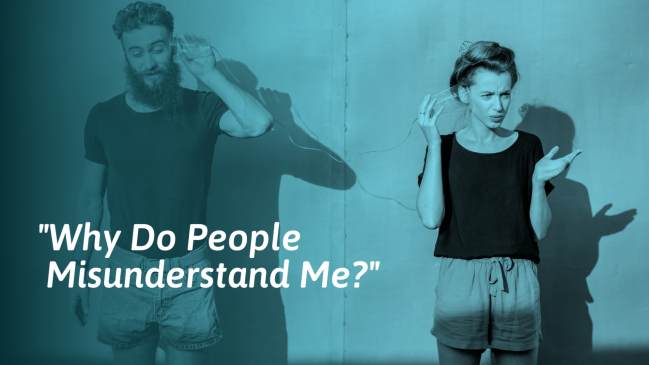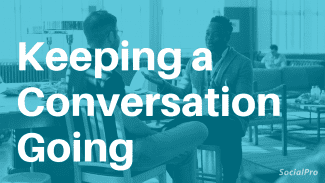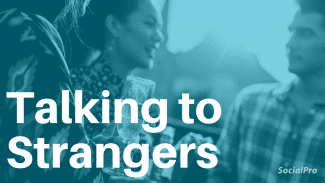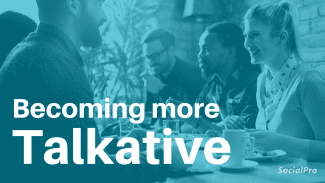“I feel like other people have an image of me that’s totally different from who I really am. Maybe it’s because I’m quiet, but even when I open up, it feels like people don’t really “get” me. How can I feel less misunderstood by people?”
Being misunderstood is lonely. It can be hard to talk to people when it feels like most of what you say gets lost in translation. For people who often feel misunderstood, communication can be frustrating, exhausting, and disappointing.
This issue is actually more normal than you might think. In 2018, 27% of adults reported that they rarely or never felt understood by other people, and almost half reported feeling lonely or disconnected.[1] Social disconnection and loneliness have negative effects on your physical and mental health and can lower your quality of life.[1, 2, 3]
This article will review common questions and causes of feeling misunderstood and provide tips on how to solve this problem.
Reasons why you feel misunderstood
There are several reasons why you may be feeling misunderstood by people, including:
- You are introverted, shy, reserved, or quiet
- You have a lot of insecurities
- You worry a lot about being judged
- You overthink everything you say
- You aren’t good at reading social cues
- You overuse sarcasm or humor
- You are a chameleon and change yourself to “fit in”
- You hold back your true thoughts, feelings, and opinions
- You feel like you are different from most people
- You have a hard time being yourself around others
- You aren’t sure who you really are
- You have a hard time showing your feelings
It’s important to mention that many of these behaviors are driven by underlying problems like social anxiety or low self-esteem.[4] While some of the strategies listed below can help you communicate more clearly, it may also be important to work on resolving these issues. You can do this on your own with self-help books for anxiety, online courses to improve your social skills and become more confident, or by seeking help from an online therapist at BetterHelp.
There are many ways to communicate in clearer ways, making it easier for people to understand you. Even making small changes in the way you talk to people can make a big difference in your relationships. Below are some ways to improve your communication so that others can understand you more easily.
1. Identify your goal
Every interaction has a goal. Sometimes the intention is clear, like calling a friend to share news or explaining a project to someone at work. In social settings, the goal may be to have a positive interaction with someone, to get to know them better, or to let them get to know you. When you identify your goal ahead of time, it can help focus the conversation and deliver the intended message in a clear way. This will make your conversations more direct and easier for the other person to understand.[5]
2. Communicate more assertively
Assertive communication is a way of being clear and direct with people while also being respectful. You are assertive when you get to the point, make your intentions known, and are honest about what you think, feel, and want. You can practice being more assertive by using “I statements,” which help you communicate in a clear and understandable way.[5] I statements are sentences that follow the following format:
- I think _______ because ________
- I feel ________ when you ______, and I would like ________
- I need ________ because _________
3. Check for understanding
Another way to avoid miscommunication is to look for social cues and check for understanding. If someone is nodding and seems interested, you are probably communicating clearly. If they look confused or you can’t get a good read on them, you can check for understanding by using one of these strategies:
- Asking, “does that make sense?” before continuing
- Asking, “do you have any questions?”
- Saying, “I’m not sure I’m being clear, so let me know if something is confusing”
4. Clarify when needed
If someone isn’t understanding you and you don’t know why, you may need to ask a follow-up question to figure out what part was unclear. Asking, “Which part didn’t make sense?” or, “what did you hear?” can help you know which gaps you need to fill in. Sometimes the problem is that they don’t understand your meaning or intention. If this is the case, clarifying might involve explaining what you meant. By checking in with people, you can often clear up a misunderstanding easily.
5. Be more expressive
People rely on nonverbal cues to understand people, so being too stoic or bland makes it hard for people to understand you.[4] If your voice is monotone or you never smile or change your facial expression, the meaning behind your words can be unclear. Sometimes, anxiety can be the source of this problem, causing you to tense up and become more like a robot than a human. Relaxing and being more expressive makes it much easier for people to understand you.[4]
6. Filter less of what you say
When you are nervous, you might overthink every interaction, trying to edit and filter everything you say. If this is an issue for you, your conversations may feel forced and awkward, and it can be hard to communicate in a natural way with people. By filtering less of what you say, you will feel more normal around people, and you will probably end up talking more. Talking more is also a great way to improve your social skills through practice and provides more data for people to draw from when they are trying to understand you.[4]
7. Change your expectations
If you feel misunderstood, you may have negative expectations about social interactions, assuming that people won’t be able to relate to you or that you have nothing in common with anyone. These negative expectations can cause you to look for rejection cues and makes it more likely you will find them, even when they aren’t really there. By having more positive expectations, you can reverse this habit and become better able to relate and connect with people.[6]
Try approaching your interactions with more positive expectations like:
- I can find something in common with everyone
- Most people are friendly
- If I open up to people, I might make some new friends
- People want to get to know me better
8. Break your own rules
If you’re reserved around others, you may have a strict set of rules dictating what you can and can’t say. While these rules protect your inner world, they can also isolate you and keep others out. Identify any rules that may be holding you back in social situations, and consider breaking ones that are keeping people out. Rules like “don’t talk about yourself,” “be the first to leave” or, “play it cool” may need to be broken if your goal is to feel more understood by people.[8]
9. Get to know yourself better
If you don’t have a good understanding of yourself, it can be difficult to know if you are being authentic with people. Since you can’t be understood without being fully authentic, self-awareness is essential. There are many ways to become more self-aware, including taking a personality test or learning your communication style. Activities like journaling, therapy, and mindfulness can also help you develop self-awareness. Because it can be hard to see yourself objectively, asking a close friend or family member for feedback can also help you become more self-aware.
We recommend BetterHelp for online therapy, since they offer unlimited messaging and a weekly session, and are cheaper than going to a therapist's office.
Their plans start at $64 per week. If you use this link, you get 20% off your first month at BetterHelp + a $50 coupon valid for any SocialSelf course: Click here to learn more about BetterHelp.
(To receive your $50 SocialSelf coupon, sign up with our link. Then, email BetterHelp’s order confirmation to us to receive your personal code. You can use this code for any of our courses.)
Common questions about feeling misunderstood
Because so many people struggle with feeling misunderstood, certain questions show up frequently on sites like Google, Reddit, and Quora. Below are answers to some of the most common questions people have about feeling misunderstood.
Why do people misunderstand me?
If you feel like no one understands you, you may be struggling with social anxiety, insecurities, or negative beliefs about yourself. Being too careful about what you say can also keep you from being open and honest with people, making it hard for people to understand you.
What do you do when someone misunderstands your intentions?
When it’s clear that someone misunderstands your intentions, it’s usually possible to go back and clarify what you meant or why you said or did something. By doing so, you will feel better about the interaction, and you can often clear up the misunderstanding.
How do you clear up a misunderstanding?
Misunderstandings can often be cleared up fairly easily. You can do this deliberately in real-time by asking if there has been a misunderstanding and restating what you meant in a different way. If you don’t realize until later, circling back to the conversation to clear things up is a good idea.
How do you deal with misunderstandings in a friendship?
When cleared up, misunderstandings can actually strengthen friendships, building trust and closeness.[7] Making an active effort to clear the air with your friend lets them know you care about them, and demonstrates that their friendship is important to you.
Final thoughts
Misunderstandings occur in relationships, but when they occur all the time, it can leave people feeling misunderstood and alone. By paying attention to social cues, verifying that people understand you, and clarifying what you mean, misunderstandings will not happen as much, and won’t be as big of a deal when they do. Feeling more understood can make it easier to build close relationships with people, which will make you happier, healthier, and more fulfilled.[1, 3]













Thank you for the actions I could take and lots of examples, too!
I definitely identified with a lot of the characteristics, I’m quieter and rather stay at home and never preferred going outside to party my brain out.
The cost of figuring out what you think isn’t just time and energy. You also run the risk of isolating yourself because your thought process brings you to a conclusion that is unrecognized by the people who you’re communicating with. The isolation that may be felt is in some sense a privilege because you’ve managed to break the script that most people are imprisoned by in some sense.
While there is power in moderating your expression to be understood, there is some space to mourn the modification of exactly what you’re saying. The balance between being misunderstood and saying exactly what you think is a sobering balance to strike nevertheless.
I did not feel like it helped me at all
Does not offer help for folks who are hugely self-confident
Didn’t feel this was accurate or helpful.
I definitely did. This literally how I feel.